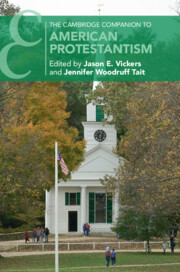Book contents
- The Cambridge Companion to American Protestantism
- Cambridge Companions to Religion
- The Cambridge Companion to American Protestantism
- Copyright page
- Dedication
- Contents
- Contributors
- Acknowledgments
- Introduction
- Part I Historical Overview
- Part II The Religious Culture of American Protestantism
- 5 Bible, Doctrine, and Theology
- 6 Worship and Preaching
- 7 Education
- 8 Work and Vocation
- 9 Politics and Government
- 10 Temperance
- 11 Gender, Sexuality, and Marriage
- 12 From Slavery to Black Lives Matter: American Protestants and Race
- 13 Faith Healing and Modern Medicine
- 14 Mental Illness
- 15 Protestant-Catholic Ecumenism and the Meanings of American Freedom
- 16 Missions
- Part III Theological Traditions
- Selected Bibliography
- Index
- Cambridge Companions to Religion (continued from page ii)
9 - Politics and Government
from Part II - The Religious Culture of American Protestantism
Published online by Cambridge University Press: 11 May 2022
- The Cambridge Companion to American Protestantism
- Cambridge Companions to Religion
- The Cambridge Companion to American Protestantism
- Copyright page
- Dedication
- Contents
- Contributors
- Acknowledgments
- Introduction
- Part I Historical Overview
- Part II The Religious Culture of American Protestantism
- 5 Bible, Doctrine, and Theology
- 6 Worship and Preaching
- 7 Education
- 8 Work and Vocation
- 9 Politics and Government
- 10 Temperance
- 11 Gender, Sexuality, and Marriage
- 12 From Slavery to Black Lives Matter: American Protestants and Race
- 13 Faith Healing and Modern Medicine
- 14 Mental Illness
- 15 Protestant-Catholic Ecumenism and the Meanings of American Freedom
- 16 Missions
- Part III Theological Traditions
- Selected Bibliography
- Index
- Cambridge Companions to Religion (continued from page ii)
Summary
Protestants have played a role in shaping the political ideology of every major party in the United States and in formulating nearly every major public policy. Most American Protestants have believed that the US government should not create a religious establishment or endorse one religious denomination or sect to the exclusion of others; they have been suspicious of any religious organization’s attempt to control the minds or votes of its followers and impose its religious principles on others through public law; and they have also generally seen political activity as a moral enterprise, governed by broadly shared (Protestant-inspired) norms. These tenets of political behavior are so deeply engrained in the nation’s consciousness that their appeal has extended well beyond Protestant circles. But as uncontroversial as most of these tenets might seem to Americans today, their development was a contested part of the nation’s history.
- Type
- Chapter
- Information
- The Cambridge Companion to American Protestantism , pp. 160 - 178Publisher: Cambridge University PressPrint publication year: 2022

